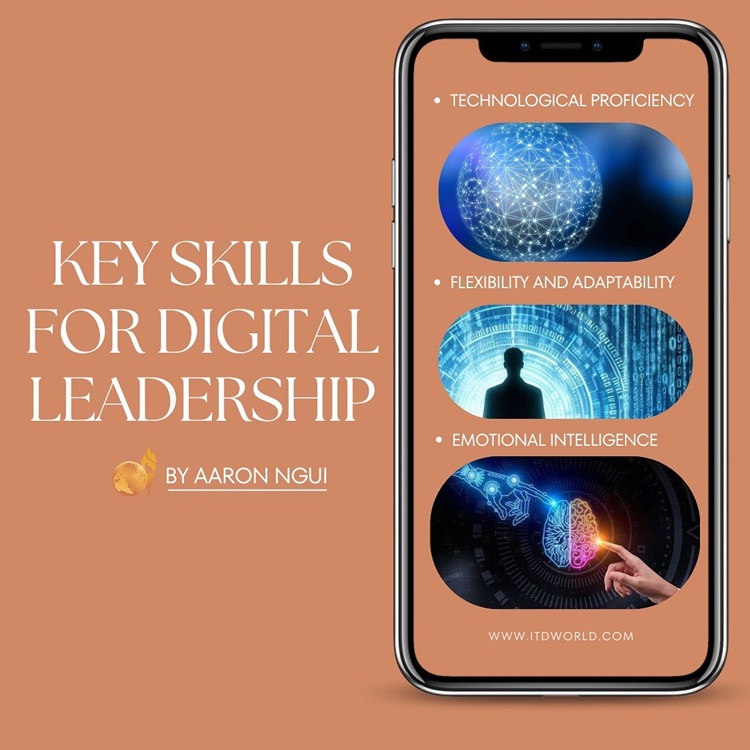The digital revolution is here, but human leadership remains crucial for long-term success. Discover the essential skills and strategies leaders need to thrive in a technology-driven world.
The digital landscape is rapidly evolving, with automation and AI fundamentally changing the way we work. While technology offers tremendous opportunities, it’s easy to feel overwhelmed or question the role of leadership in this new era. However, the human touch remains a critical differentiator for sustainable success.
|
Author: Aaron Ngui |
Highlights
- Despite the rise of digital tools, effective leadership in today’s world requires balancing technological expertise with strong interpersonal skills to motivate and empower people. In other words, human connection, well-being, and purpose must all be prioritized.
- Leaders these days need to understand technology, adapt to change, and possess high emotional intelligence to manage remote teams effectively. They should aim to cultivate a culture of experimentation, data-driven decisions, and inclusive collaboration using digital tools.
The Importance of Human Leadership in a Digital World
Effective leadership in an increasingly digital world requires one to cultivate new skills, strategies, and mindsets to thrive and lead effectively. Even though digital leadership can be viewed as using technology and digital assets to address challenges, people still matter.
Successful digital leadership means appreciating that people play a crucial role in facilitating results. After all, it is the people who are executing the actions needed to overcome issues and problems organizations face. It is also the people who are leveraging the technology and digital tools to enable business outcomes. This belief that all human beings have potential is important for leaders to cultivate to drive connections and results amid a digital revolution.
To improve performance and productivity in today’s world, leaders should consider how they can strike a balance between people-centered skills and technological know-how. This could mean developing their own interpersonal approaches while getting familiar with the latest technological developments.
We talk about automating operations, about people, and about new business models. Wrapped inside those topics are data analytics, technologies, and software – all of which are enablers not drivers. In the center of it all is leadership and culture. Understanding what digital means to your company – whether you’re a financial, agricultural, pharmaceutical, or retain institution – is essential.
Jim Swanson, Senior Vice President/CIO and Head of Digital Transformation, Bayer Crop Science

Key Skills for Digital Leadership
-
Technological Proficiency
Being the go-to expert may not be necessary for digital leadership. Even so, leaders must understand the technology that impacts their industry. This allows them to mitigate risks by making informed decisions. Leaders who understand how technology affects their operations are better able to leverage innovations for productivity gains.
For instance, accounting firms using software from a decade ago may be missing out on efficiency gains compared to firms using the latest toolkit. Leaders who are familiar with the technology impacting their field are also more comfortable to leverage on new innovations to drive results. As an example, many organizations have moved their IT operations to the cloud to take advantage of the better speed, scalability, and security cloud services offer.
-
Flexibility and Adaptability
Leaders in a digital world intuitively know the pace of change is rapid and relentless. As such, a good digital leadership skill is to be agile and adapt to respond to market conditions. They should be capable of pivoting quickly in response to new developments and navigating the complexities of a digital economy.
Leaders who thrive on challenges and flexibility are better positioned to survive and thrive in today’s dynamic landscape. For example, many organizations had to pivot their operations when the COVID-19 pandemic hit. Many adapted operations to leverage remote working. Leaders then demonstrated flexibility to implement the new workflows and processes to ensure productivity did not suffer during and after the transition.
It was no different with ITD World as face-to-face classes, programs, and workshops were no longer allowed at that time. Changes were quickly made to move sessions online to ensure business continuity. It was also at this time the leadership forged new strategic partnerships to enable the creation of the Certified Chief Master Coach (CCMC) program. The CCMC brings together some of the best leadership and coaching gurus in one profound journey to drive mastery and excellence.
Read more: Agility Coaching – Navigating Change & Fueling Business Success
-
Emotional Intelligence
Remote work and virtual teams used to be a niche concept. They were often talked about, but rarely experienced. Not so now. In a digital age, these are becoming the norm. Empowering their effectiveness means emotional intelligence (EQ) is more vital than ever as challenges in fostering collaboration, maintaining morale, and strong communication are amplified.
Leaders who demonstrate strong digital leadership possess high EQ. They build strong relationships among their team members, forge strong collaborative ties across functions and departments, and enhance team morale. They do so by practicing active listening. This means they pay close attention to the speaker during online meetings and show understanding and empathy. They are also good communicators. Such leaders emphasize clear and transparent communication and leverage digital tools to keep people informed and engaged so information flows smoothly.
Also, high EQ leaders can manage conflicts effectively. This is done by addressing issues promptly and fairly to ensure team dynamics remain positive.
Read more: Leadership Development – A Mission-critical Strategic Function

Strategies for Effective Digital Leadership
-
Fostering a Digital Culture
Effective digital leadership aims to create a culture that embraces digital transformation. This involves encouraging experimentation, promoting continuous learning, and supporting innovation. Leaders must model these behaviors and create an environment where people feel empowered to take the initiative.
An oft-cited example is Google where employees there are allowed to spend 20% of their time on projects they are passionate about. Successful products like Gmail and Adsense are some of the results that emerged from this policy.
-
Leveraging Data-Driven Decision Making
The lifeblood of the digital world is data. Effective leaders leverage data to inform their decisions, drive performance, and anticipate trends. This requires a solid understanding of data analytics and the ability to interpret and act on data insights.
An example of using data to enable change is the robust eAssessment system from ITD World. This system lets organizations collect data to build actionable information so resources can be targeted at the right place for maximum effect.
The highly customizable system can collect data from various operational and strategic functions to provide insights into leadership competencies, employee engagement, high performance, and more. These insights help decision makers to pinpoint strengths and areas for improvement, facilitating targeted interventions and strategic resource allocation.
-
Encouraging Collaboration and Inclusivity
Digital tools and platforms facilitate collaboration across geographical and physical boundaries. Leaders must harness these tools to build inclusive and collaborative teams. This includes leveraging diverse perspectives and ensuring that all voices are heard.
An effective approach to foster collaboration and inclusivity is to stay curious. Leaders who cultivate an approach of curiosity that ignites the spirit can better tap into the strengths of inclusivity. People who remain curious tend to seek out information from various sources and viewpoints. In a leadership role, driving exploration to discover new methods, processes, and approaches encourages people to speak up and be heard. Genuine curiosity allows for ideas to thrive, making people feel included and contributing to team success.
Anyone should be able to tell me anything, that’s the culture we strive for.
Satya Nadella, Microsoft CEO

Read more: 7 Leadership Mistakes to Avoid – From Failure to Success
The Human Element in Digital Leadership
Although conversations surrounding digital leadership usually tend to be dominated by technology, the human element remains at the core of successful transformation. Leaders should balance the efficiencies and capabilities of tools with people’s inherent need for connection, purpose, and well-being.
-
Maintaining Human Connection
Communication tools can bridge physical distances but paradoxically can sometimes create a sense of isolation too. Leaders should prioritize maintaining human connections and fostering a sense of community within their teams. This can be achieved through regular check-ins, virtual team-building activities, and creating opportunities for informal interactions.
A good approach during meetings, regardless if face-to-face or online, is to be present and turn off your inner dialogue. Being present means being focused on the other person’s agenda, making the mental space available for interaction, and demonstrating an understanding of the situation. Leaders who practice being present and turn off their inner dialogue during conversations and meetings make their presence felt and enhance the human connection.
Read more: The Power of Cross-Cultural Communication in Coaching & Leadership Development
-
Promoting Wellbeing in Digital Leadership
Burnout may be the result of the always-on nature of the digital world. To mitigate this, leaders who practice good digital leadership can promote wellness and well-being practices.
A quick primer on wellness is the six-step BEDSMS formula. These are:
- Proper Breathing;
- Regular Exercises;
- A nutritious Diet;
- Sufficient Sleep:
- Natural Medicinal supplements; and
- Spiritual Fulfilment.
These six steps encapsulated into the BEDSMS formula let people start on the road towards good well-being.
Read more: Love Leadership – More Than an Abstract Philosophical Idea
-
Drive Leadership with Purpose
The pace of change can be overwhelming in a digital world. Leaders who provide a sense of purpose and direction equip their teams to better navigate the rapid shifts in the environment. Team members can stay anchored on the purpose and orient their way toward the right direction for business outcomes.
An example is the outdoor apparel company Patagonia. Their purpose is centered on environmental sustainability. This attracts customers and potential team members who share similar values. The result is a loyal customer base and a committed work team.
Instead of assuming only one group has all the solutions, scout around for those who have already fixed the challenges or have created something promising … It’s really about using collective genius. We can get ourselves cross-organized and solve a lot more of these problems faster.
Megan Smith, served as US Chief Technology Officer under the Obama administration

Read more: Employee Skill Development – Boost Your Bottom Line
Moving Forward
Effective digital leadership in today’s increasingly changing world is a dynamic and evolving challenge. Leaders are called upon to adopt a unique blend of technological proficiency, flexibility, EQ, and a strong focus on human connection and well-being. By fostering a strong culture, leveraging data-driven decision-making, and promoting inclusivity, they may position themselves better to navigate the complexities of the digital landscape for the desired outcomes.
Other resources you might be interested in:
- 9 Key Leadership Skills for the Future of Work
- 10 L&D Trends to Help Your Workforce Thrive
- Talent Transformation: Build a Future-ready Workforce
- AI in Leadership: Bridging the Gap Between Adoption & Maturity
- Leadership Philosophy: How to Define Your True North & Follow It

